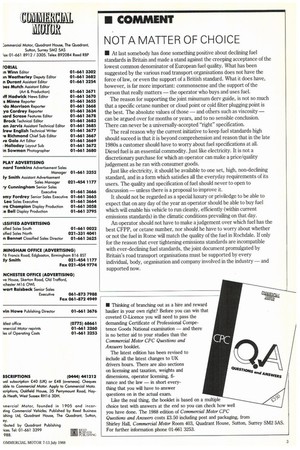NOT A MATTER OF CHOICE
Page 3

If you've noticed an error in this article please click here to report it so we can fix it.
• At last somebody has done something positive about declining fuel standards in Britain and made a stand against the creeping acceptance of the lowest common denominator of European fuel quality. What has been suggested by the various road transport organisations does not have the force of law, or even the support of a British standard. What it does have, however, is far more important: commonsense and the support of the person that really matters — the operator who buys and uses fuel.
The reason for supporting the joint minumum dery guide, is not so much that a specific cetane number or cloud point or cold filter plugging point is the best. The absolute values of those — and others such as viscosity — can be argued over for months or years, and to no sensible conclusion. There can never be a universally-accepted "right" specification.
The real reason why the current initiative to keep fuel standards high should suceed is that it is beyond comprehension and reason that in the late 1980s a customer should have to worry about fuel specifications at all. Diesel fuel is an essential commodity. Just like electricity. It is not a discretionary purchase for which an operator can make a price/quality judgement as he ran with consumer goods.
Just like electricity, it should be available to one set, high, non-declining standard, and in a form which satisfies all the everyday requirements of its users. The quality and specification of fuel should never to open to discussion — unless there is a proposal to improve it.
It should not be regarded as a special luxury or priviledge to be able to expect that on any day of the year an operator should be able to buy fuel which will enable his vehicle to run cleanly, efficiently (within current emissions standards) in the climatic conditions prevailing on that day.
An operator should not have to make a judgement over which fuel has the best CFPP, or cetane number, nor should he have to worry about whether or not the fuel in Rome will match the quality of the fuel in Rochdale. If only for the reason that ever tightening emissions standards are incompatible with ever-declining fuel standards, the joint document promulgated by Britain's road transport organisations must be supported by every individual, body, organisation and company involved in the industry — and supported now.


















































